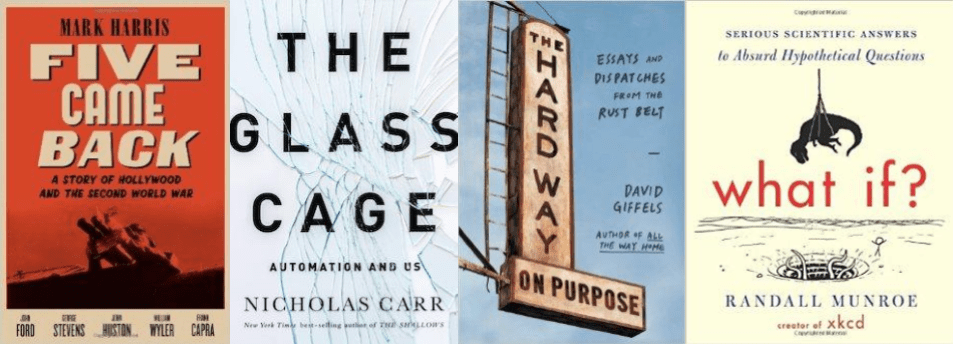
My favorite books from 2014 are all nonfiction, a thoroughly unsurprising result of it being way easier for me to get through a 700-page historical tome than a 200-page novel. Sorry, novels: this year it was especially true that the truth is stranger and more fascinating than fiction.
Deep: Freediving, Renegade Science, and What the Ocean Tells Us about Ourselves by James Nestor
I wrote about Deep before and will keep writing about it to get people to read it. Despite submerging to depths few humans can withstand, Nestor only breaks the surface of what there is to know about the ocean and the people who explore it. He nimbly interweaves his experience learning how to freedive, which is like scuba diving sans equipment, with science of the deep and what we’ve yet to illuminate about the dark depths of our world.
Five Came Back: A Story of Hollywood and the Second World War by Mark Harris
Good to see this getting love from other year-end lists. The adept synthesizing Harris did in his first book, Pictures at a Revolution, shows up again in Five Came Back, which follows five top Hollywood directors through their unique wartime experiences. They encountered nearly every major part of the war, at home and abroad, and bring back hard-won lessons and personal experience that inform and mold their postwar work.
The Glass Cage: Automation and Us by Nicholas Carr
Wrote about this in October. It’s important to convey that Carr doesn’t think automation is bad (Alan Jacobs makes this clear in his review at Books & Culture), only that we have to make sure that it doesn’t make us worse off. Because there’s so much automation can do for us, it’s easy to start ceding other things to it without considering the consequences. Carr provides a good foundation for that consideration.
The Hard Way on Purpose: Dispatches from the Rust Belt by David Giffels
A series of essays on living in Akron, heart of the Rust Belt and perpetual underdog. Giffels writes about LeBron James, the Cleveland Browns, Chuck Taylor, about watching all his friends leave and the travails of Ohio living. Midwesterners who have seen their town, however big or small, decay amidst the wreckage of industrialization and unforgiving weather will find something familiar and bittersweet in Giffels’ writing.
What If? Serious Scientific Answers to Absurd Hypothetical Questions by Randall Munroe
I just got this at a used bookstore because I couldn’t resist. It’ll also give me a chance to better absorb the wonderfully rendered comic scenarios and Munroe’s dry humor, which I first devoured in one sybaritic sitting. Never before had I considered what would happen if someone tried to hit a baseball pitched at 90 percent the speed of light, but thanks to this book I now know. Great fodder for book groups and coffee tables of nerds.
